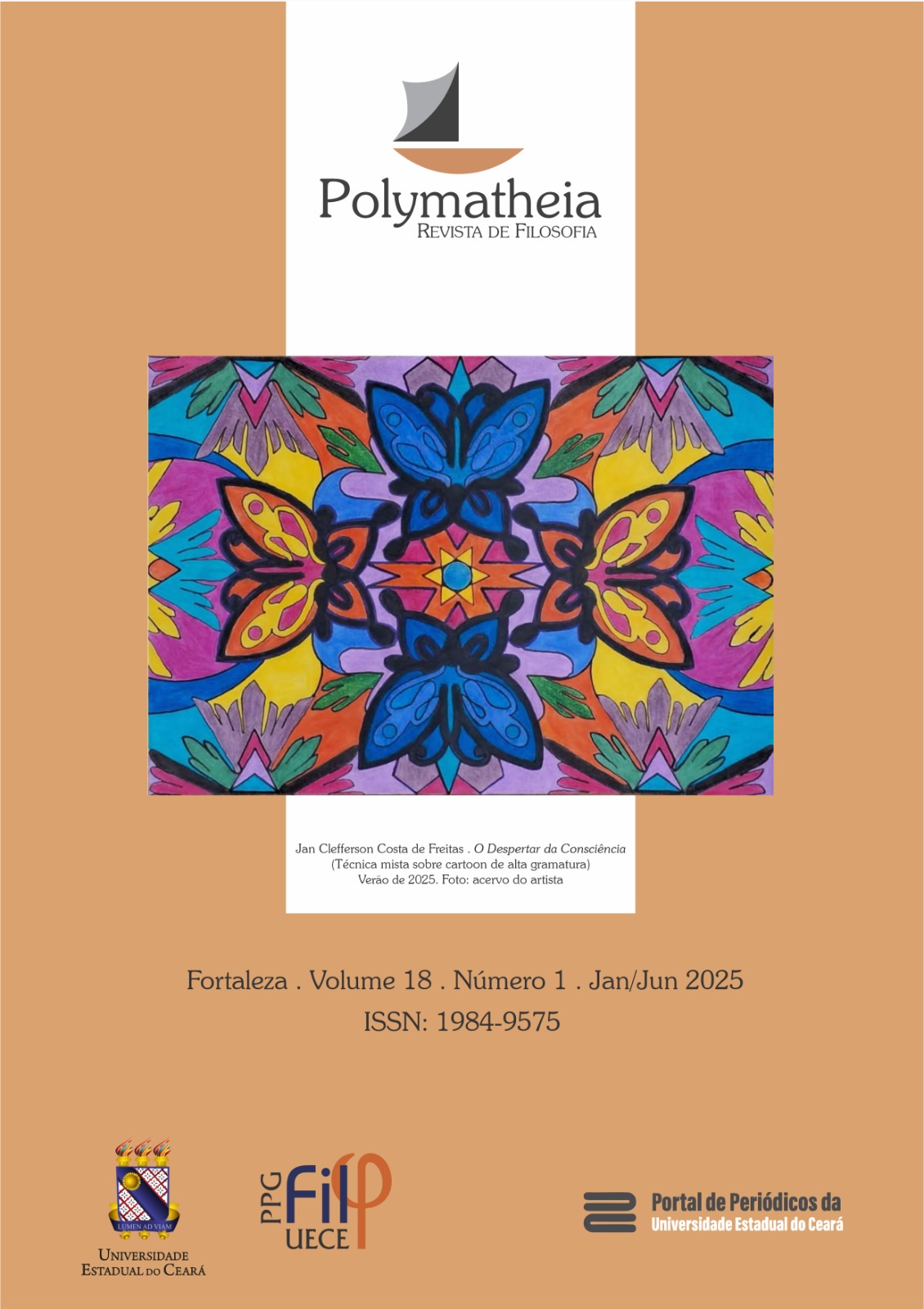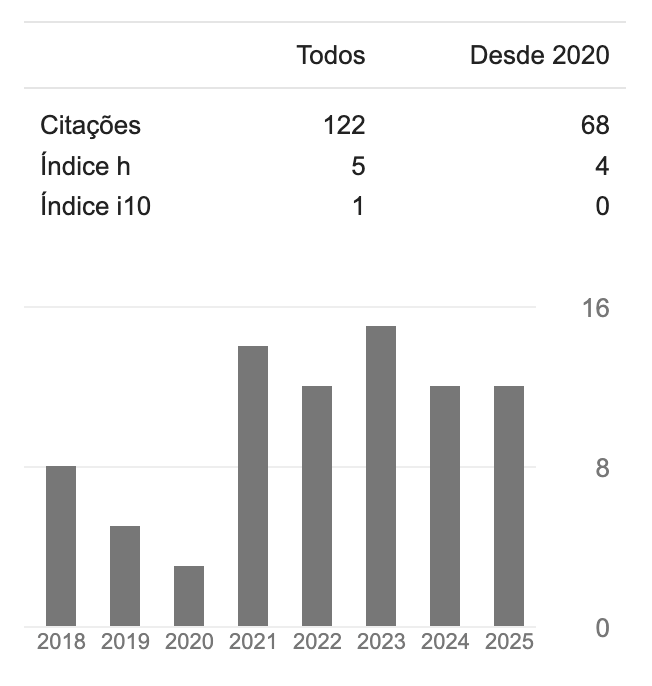A ''classificação dos bens'' de Gláucon: Um breve estudo sobre o tema da República de Platão
DOI:
https://doi.org/10.52521/poly.v18i1.14023Resumo
Para a esmagadora maioria dos intérpretes, a definição da Justiça ou a busca do que seja ela consiste no principal tema da República de Platão. Não está equivocado. Porém, para nós, é incompleto. Com o fim do Livro I da República, a procura pela definição da justiça continua em aberto. Porém, com a arguição de Gláucon que é frequentemente chamada pelos comentadores de o ‘‘Desafio de Gláucon’’, o tema da República é reestabelecido. Entender este importante trecho de apenas 2 páginas do começo do Livro II da República é muito cara a Ética platônica e gera as mais diversas interpretações. Não compreender este trecho com cuidado pode, para nós, fazer comprometer o que seria o real tema do diálogo. E para que isso não venha a ocorrer, temos uma hipótese interpretativa, que consiste em demonstrar que com a provocação de Gláucon, o tema da República é reposto, a saber, que Sócrates dali em diante terá de demonstrar como viver de forma virtuosa (incluindo: de forma justa) nos leva a Felicidade. Ou seja, a relação entre a virtude, enquanto um bem, e a Felicidade está em jogo. Esta hipótese tornará explícito o caminho que o diálogo tomará dali em diante em torno da discussão sobre a Justiça, nos auxiliando a compreender o enredo do diálogo como um todo.
For the overwhelming majority of interpreters, the definition of Justice or the search for what it is is the main theme of Plato's Republic . This is not wrong. However, for us, it is incomplete. With the end of Book I of the Republic, the search for the definition of justice remains open. However, with Glaucon's argument, which is often referred to by commentators as "Glaucon's Challenge", the theme of the Republic is re-established. Understanding this important passage of just two pages at the beginning of Book II of the Republic is very dear to Platonic ethics and generates the most diverse interpretations. Failure to understand this passage carefully could, in our view, compromise the real theme of the dialogue. To prevent this from happening, we have an interpretative hypothesis, which consists of demonstrating that with Glaucon's provocation, the theme of the Republic is restored, namely that Socrates will henceforth have to demonstrate how living virtuously (including: justly) leads to Happiness. In other words, the relationship between virtue, as a good, and Happiness is at stake. This hypothesis will make explicit the path that the dialog will take from then on around the discussion of Justice, helping us to understand the plot of the dialog as a whole.
Downloads
Referências
ANNAS, J. An Introduction to Plato’s Republic. New York: Oxford University Press, 1981.
ARISTÓTELES. Ética a Nicômaco. Trad. de Leonel Vallandro e Gerd Bornheim. 1 ed. São Paulo: Abril Cultural (Col. Os Pensadores), 1973.
ARISTÓTELES. Metafísica (bilíngue). Trad. e comentário de Geovanni Reale. São Paulo: Loyola, 2002.
COOPER, J. M.. ‘‘Plato’s Theory of Human Motivation’’. In: FINE, G. Plato 2: Ethics, Politics, Religion, and the Soul. Oxford: Oxford University Press, 1999.
MABBOTT, J. D. ‘‘Is Plato’s Republic Utilitarian?’’. In: Gregory Vlastos, ed., Plato: A Collection of Critical Essays, II: Ethics, Politics, and Philosophy of Art and Religion. Modern Studies in Philosophy. Garden City, New York: DoublEday, Anchor Books, 1971.
PENNER, T. ‘‘The Good, Advantage, Happiness and the Form of the Good: How Continuous with Socratic Ethics is Platonic Ethics? In: Pursuing the Good: Ethics and Metaphysics in Plato’s Republic. Edinburgh: Edinburgh University Press, 2007
PLATÃO. Platonis opera. Ed. J. Burnet. Et. Oxford: Oxford Clarendon Press, 1900 – 1909
PLATÃO. República. 9. ed Tradução de Maria Helena da Rocha Pereira. Lisboa: Fundação Calouste Gulbbenkian, 2001
PLATÃO. Eutidemo. Trad. de Maura Inglésias. Rio de Janeiro: Ed. PUC Rio: Loyola, 2011.
PLATÃO. Protágoras. Trad., ensaio introdutório e notas de Daniel Lopes. FAPESP: Perspectiva, 2017.
PLATÃO. Mênon. Trad. de Maura Inglésias. Rio de Janeiro: Ed. PUC Rio: Loyola, 2001.
ROBINSON, R. Plato's Earlier Dialectic. New York: Cornell University Press, 1941
SACHS, D. ‘‘A fallacy in Plato’s Republic’’. In: Gregory Vlastos, ed., Plato: A Collection of Critical Essays, II: Ethics, Politics, and Philosophy of Art and Religion. Modern Studies in Philosophy. Garden City, New York: DoublEday, Anchor Books, 1971.
SILVA, José Wilson da. ‘‘Função Própria, Partes da Alma e Virtude Moral na Ética Platônica’’. In: Polymatheia: Revista de Filosofia, v. 12, n. 20, pgs. 145-171, Jan/Jun, 2020
SHOREY, P. ‘‘Plato’s Ethics’’. In: VLASTOS, G. Plato: A Collection of Critical Essays, II: : Ethics, Politics and Philosophy of Art and Religion. Modern Studies in Philosophy. New York: DoublEday, Anchor Books, 1971
WEISS, R. ‘‘The Hedonic Calculus in the Protagoras and the Phaedo’’. In: Journal of the History of Philosophy. Baltimore: Johns Hopkins University Press, v. 27, n. 4, pgs. 511- 529, Oct. 1989.
WHITE, P. N. ‘‘The Classification of Goods in Plato’s Republic’’. In: Journal of the History of Philosophy. Baltimore: Johns Hopkins University Press, v. 22, n. 4, pgs. 393 – 431, Oct. 1984.
Downloads
Publicado
Como Citar
Edição
Seção
Licença
Copyright (c) 2025 Francisco Gabriel Marques de Almeida Caroba

Este trabalho está licenciado sob uma licença Creative Commons Attribution 4.0 International License.











